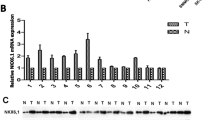Abstract
Nemo-like kinase (NLK) is an evolutionarily conserved serine/threonine protein kinase and belongs to the extracellular signal-regulated kinases/microtubule-associated protein kinase families (Erks/MAPKs). Previous studies have indicated that abnormal expressions of NLK played critical roles in various types of human cancers. Recent studies suggested that NLK expression was significantly upregulated in the hepatocellular carcinoma (HCC) specimens. However, the clinical significance of NLK expression in HCC remains largely unknown. In this study, we focused on the clinical significance of NLK in HCC and found that high expression of NLK was significantly associated with Edmondson–Steiner grade (P = 0.002), tumor size (P = 0.022), and no. of tumor nodules (P < 0.001), and NLK was positively correlated with proliferation marker Ki-67 (P < 0.01). Univariate analysis suggested that NLK expression was associated with poor prognosis (P < 0.001). Multivariate analysis indicated that NLK expression was an independent prognostic indicator for HCC (P = 0.0370). In conclusion, NLK overexpression is associated with poor overall survival in patients with HCC, it might be an independent poor prognostic marker for HCC.



Similar content being viewed by others
References
Llovet JM, Burroughs A, Bruix J. Hepatocellular carcinoma. Lancet. 2003;362:1907–17.
Munoz A, Chen JG, Egner PA, Marshall ML, Johnson JL, Schneider MF, et al. Predictive power of hepatitis b 1762T/1764A mutations in plasma for hepatocellular carcinoma risk in Qidong, China. Carcinogenesis. 2011;32:860–5.
El-Serag HB, Rudolph KL. Hepatocellular carcinoma: epidemiology and molecular carcinogenesis. Gastroenterology. 2007;132:2557–76.
Wang XM, Yang LY, Guo L, Fan C, Wu F. p53-induced RING-H2 protein, a novel marker for poor survival in hepatocellular carcinoma after hepatic resection. Cancer. 2009;115:4554–63.
Lv L, Wan C, Chen B, Li M, Liu Y, Ni T, et al. Nemo-like kinase (NLK) inhibits the progression of NSCLC via negatively modulating WNT signaling pathway. J Cell Biochem. 2014;115:81–92.
Mendes-Pereira AM, Lord CJ, Ashworth A. NLK is a novel therapeutic target for PTEN deficient tumour cells. PLoS One. 2012;7, e47249.
Li Z, Cui G, Wang J, Yu Z, Zhao L, Lv Z. Nemo-like kinase (NLK) involves in neuronal apoptosis after traumatic brain injury. Cell Mol Neurobiol. 2012;32:381–9.
Ota S, Ishitani S, Shimizu N, Matsumoto K, Itoh M, Ishitani T. NLK positively regulates Wnt/beta-catenin signalling by phosphorylating lef1 in neural progenitor cells. EMBO J. 2012;31:1904–15.
Yasuda J, Tsuchiya A, Yamada T, Sakamoto M, Sekiya T, Hirohashi S. Nemo-like kinase induces apoptosis in DLD-1 human colon cancer cells. Biochem Biophys Res Commun. 2003;308:227–33.
Tan Z, Li M, Wu W, Zhang L, Ding Q, Wu X, et al. NLK is a key regulator of proliferation and migration in gallbladder carcinoma cells. Mol Cell Biochem. 2012;369:27–33.
Li M, Zhang S, Wang Z, Zhang B, Wu X, Weng H, et al. Prognostic significance of nemo-like kinase (NLK) expression in patients with gallbladder cancer. Tumour Biol. 2013;34:3995–4000.
Jung KH, Kim JK, Noh JH, Eun JW, Bae HJ, Xie HJ, et al. Targeted disruption of Nemo-like kinase inhibits tumor cell growth by simultaneous suppression of cyclin D1 and CDK2 in human hepatocellular carcinoma. J Cell Biochem. 2010;110:687–96.
Zhou L, Rui JA, Ye DX, Wang SB, Chen SG, Qu Q. Edmondson-Steiner grading increases the predictive efficiency of TNM staging for long-term survival of patients with hepatocellular carcinoma after curative resection. World J Surg. 2008;32:1748–56.
Woelfle U, Cloos J, Sauter G, Riethdorf L, Janicke F, van Diest P, et al. Molecular signature associated with bone marrow micrometastasis in human breast cancer. Cancer Res. 2003;63:5679–84.
Li X, Pan Y, Fan R, Jin H, Han S, Liu J, et al. Adenovirus-delivered ciapin1 small interfering RNA inhibits HCC growth in vitro and in vivo. Carcinogenesis. 2008;29:1587–93.
Han Y, Kuang Y, Xue X, Guo X, Li P, Wang X, et al. NLK, a novel target of miR-199a-3p, functions as a tumor suppressor in colorectal cancer. Biomed Pharmacother. 2014;68:497–505.
Emami KH, Brown LG, Pitts TE, Sun X, Vessella RL, Corey E. Nemo-like kinase induces apoptosis and inhibits androgen receptor signaling in prostate cancer cells. Prostate. 2009;69:1481–92.
Cui G, Li Z, Shao B, Zhao L, Zhou Y, Lu T, et al. Clinical and biological significance of nemo-like kinase expression in glioma. J Clin Neurosci. 2011;18:271–5.
Wang K, Wang X, Zou J, Zhang A, Wan Y, Pu P, et al. miR-92b controls glioma proliferation and invasion through regulating Wnt/beta-catenin signaling via Nemo-like kinase. Neuro Oncol. 2013;15:578–88.
Zhang Y, Peng C, Wu G, Wang Y, Liu R, Yang S, et al. Expression of NLK and its potential effect in ovarian cancer chemotherapy. Int J Gynecol Cancer. 2011;21:1380–7.
Huang Y, Jiang Y, Lu W, Zhang Y. Nemo-like kinase associated with proliferation and apoptosis by c-Myb degradation in breast cancer. PLoS One. 2013;8, e69148.
Zhang B, Li KY, Chen HY, Pan SD, Chen SF, Zhang WF, et al. Lentivirus-based RNA silencing of Nemo-like kinase (NLK) inhibits the CAL 27 human adenosquamos carcinoma cells proliferation and blocks G0/G1 phase to S phase. Int J Med Sci. 2013;10:1301–6.
Chen S, Ma Z, Chen X, Zhang J. Prognostic significance of nemo-like kinase in nasopharyngeal carcinoma. Mol Med Rep. 2014;10:131–6.
Mann CD, Neal CP, Garcea G, Manson MM, Dennison AR, Berry DP. Prognostic molecular markers in hepatocellular carcinoma: a systematic review. Eur J Cancer. 2007;43:979–92.
Acknowledgments
We would like to acknowledge the reviewers for their helpful comments on this paper. We would also like to thank our colleagues at the Department of Clinical Laboratory, the First Hospital of Qinhuangdao.
Conflicts of interest
None
Author information
Authors and Affiliations
Corresponding author
Rights and permissions
About this article
Cite this article
Chen, HW., Qiao, HY., Li, HC. et al. Prognostic significance of Nemo-like kinase expression in patients with hepatocellular carcinoma. Tumor Biol. 36, 8447–8453 (2015). https://doi.org/10.1007/s13277-015-3609-6
Received:
Accepted:
Published:
Issue Date:
DOI: https://doi.org/10.1007/s13277-015-3609-6




